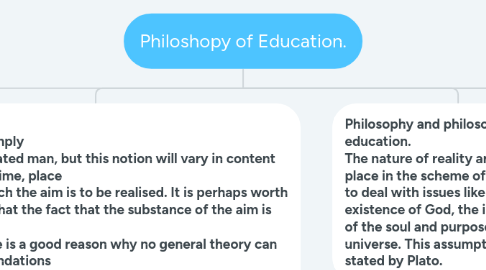
1. Philosophy and philosophy of education. The nature of reality and of man’s place in the scheme of things, and to deal with issues like the existence of God, the immortality of the soul and purpose of the universe. This assumptions were stated by Plato.
2. The nature of educational theory. Well when we talk about the nature of educational theory we touch on ‘teaching’, ‘learning’, ‘knowledge’ and experience.An indefinite number of such topics, with an indefinite number of associated concepts. The theorist may be making a general point about education. He may say, for example, that education is the most effective way, or the only way, of socialising the young, of converting them from human animals into human beings, or of enabling them to realise their intellectual and moral potentialities. Or he may say that education is the best way to establish a sense of social solidarity, by giving everyone a common cultural background. The other kind of educational theory is one which does not set out, primarily at least, to give a description of the role or function of education but rather to give advice or rec- ommendations about what those engaged in educational practice ought to be doing. Such theories are ‘practical’ theories, giving reasoned prescriptions for action. Theories of this kind exhibit a wide variety, in scope, content and complexity.
2.1. Theory and Practice
2.1.1. Educational theory and educational practice Education has its own immediate higher-order activity, educational theorising, the making of theories about education and theories of education. The further point was made that philosophy of education is another higher-order activity parasitic upon the practice and theory of education. It is not the same thing as educational theory, but it takes theory as its main subject matter.
3. In philosophy they tend to ask a lot of questions and in the field of the education this excels with a lot of information. What, he will ask, does ‘education’ involve? What exactly is teaching? What has to be the case before anyone can properly be said to ‘know’ anything? What criteria have to be satisfied before what a teacher does can truly be characterised as ‘punishing’? Questions like these and the answers to them have interested not only the great historical theorists like Plato and Rousseau, but also many of those engaged in everyday educational affairs. In conclusion philosophy of education is a amazing way to argument and discuss betwwen classmates or with your professor. The distinction made above between educational theorising and philosophy of education, though useful as a heuristic strategy, is by no means so clear-cut as the account given might seem to suggest. The borderline between these two activities is not always well-defined and it is sometimes a matter of emphasis whether a writer may be said to be offering a theory or engaging in philosophy. The second point is that while this book is about philosophy of education it will not confine itself to a description of what philosophers of education are trying to do. The best way of introducing philosophy is to do some philosophy and so from time to time in the following chapters some elementary philosophising will be tried out. A beginning has already been made.
4. Educational Aims. The formal aim simply demands an educated man, but this notion will vary in content according to the time, place and culture in which the aim is to be realised. It is perhaps worth mentioning here that the fact that the substance of the aim is bound to be culture-relative is a good reason why no general theory can provide recommendations applicable to all educational situations and why no such general theory will command universal acceptance.
4.1. Aims and purpose
4.1.1. The distinction between aims and purposes is relevant to talk about education. A teacher may be asked to state his aim in a particular lesson, that is, to make clear what he is doing or trying to do. He may also be asked what is really a separate question, namely, why he is doing it, what he is doing it for, what his purpose is in trying to get his pupils to write poetry or to solve quadratic equations. The purpose of education, it might be said, is to increase the number of literate, knowledgeable citizens, or to produce sufficient numbers of doctors, lawyers, civil servants, engineers and the like. Well aim and purpose are two strong word that are linked when you talk about education because as aim is to produce a educated man but this will not be completed withput he may ask why I am an educated man.
4.2. Assumptions about Human Nature
4.2.1. A general theory of education begins, logically, with an assumption about an end, the notion of an educated man. To realise this end it recommends certain pedagogical procedures for practice. But between the aim and the procedures there must be certain assumptions made about the raw material, the person to be educated. It has to be assumed that human nature is to some extent malleable, that what happens to the pupil by way of experience has some lasting effect on his subsequent behaviour. There would be no point in trying to teach children if whatever was done could make no difference to them.

